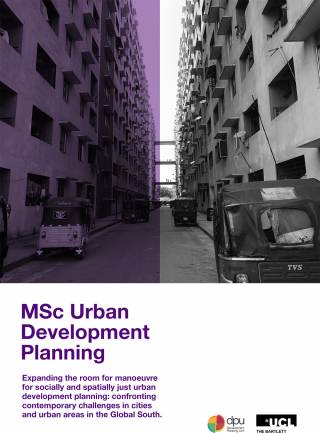The Urban Development Planning MSc provides the analytical and practical tools to engage reflexively with urban development and planning challenges in the Global South.
YouTube Widget Placeholderhttps://youtu.be/awKom1GMdTU?si=nT3TZkFcyWooANtF
About the course
The MSc Urban Development Planning (UDP) seeks to provide candidates with the analytical and practical tools to engage reflexively with the urban development and planning challenges thrown up by rapid social, economic and political change in the urban global south.
The challenge for urban development planning is to respond to these problems, working with urban communities to transform cities into places where women and men of different classes, ethnic groups, religions and ages, can exercise real individual and collective choice in their lives.
On this page
- Who should apply?
- Course structure
- Practice in Urban Development Planning
- Careers and employability
- Staff
- More information
Who should apply?
The Urban Development Planning MSc is designed for graduates and practitioners from diverse disciplinary, cultural and geographic backgrounds, who are interested in revisiting the role of planning (and the planner) in urban contexts. Blending theory and practice, we aim to equip graduates with the analytical and practical tools necessary to promote more socially, spatially and environmentally just responses to today's pressing urban challenges.
Course structure
Core and Optional Modules
The programme consists of lectures, seminars, workshops, case study analysis and practice engagement in London and abroad. Students are expected to play an active part in their learning through reading, participation in class activities and individual and group work. An important emphasis is placed on group work as a key aspect of a relational planning practice.
The programme is structured so that 75 per cent of the taught components of the programme (90 credits) are devoted to the core subjects of Urban Development Planning and 25 per cent (30 credits) to an option from a range of modules on offer.
The core modules provide the theoretical and methodological components of the programme while the optional module allows students to examine different approaches and problems in accordance with their particular interests. Teaching takes place in the first two terms of the academic year (September to March) with the exception of the Practice in Urban Development Planning module which spans three terms (September to June).
The three compulsory core modules run throughout the first and second terms, with the exception of one module ('Practice in urban development planning') which runs across all three terms.
A module is finalised once work is completed in all its elements of performance assessment, i.e. course work, essays, project reports and, where required, written exams.
- Read more about our core modules
- The City and Its Relations: Context, Institutions and Actors in Urban Development Planning explores the economic, social and physical change of cities in the wider context of development and globalisation.
- Urban Development Policy, Planning and Management: Strategic Action in Theory and Practice explores strategic action in urban development policy, planning and management which recognises social justice in cities.
- Practice in Urban Development Planning provides students with real-life platforms to explore a number of the contemporary challenges of urban development planning and governance in practice.
- Read more about our optional modules
- Gender in Policy and Planning is a module run over one term, examining gender relations in the socio-economic, political and environmental processes in the development of human settlements.
- Transport Equity and Urban Mobility focuses on the relationships between social identity, transport and planning in the context of urban development in the Global South. It critiques and explores the implications for transport planning and its interaction with other kinds of planning, and the relationships between the state, civil society and private sector in the provision of transport for more socially just cities.
Our students can also choose optional modules offered by other master's programmes at The Bartlett Development Planning Unit, or modules offered by other departments within UCL.
More details of these modules can be found in the UCL module catalogue.
Please note that the course structure and list of modules given here is indicative. This information is published a long time in advance of enrolment and module content and availability are subject to change.
Practice in Urban Development Planning
The Urban Development Planning MSc embraces both theory and practice, with our 'Practice in urban development planning' core module being specifically practice-oriented.
- UK practice engagements
Students engage in a practice exercise in London equipping students with the knowledge, techniques and skills required on the ground from practitioners. The skills learnt are directly transferable to the overseas practice engagement which takes place later in the year.
During the first term, in November, students also attend an intensive three-day residential workshop at Cumberland Lodge, Windsor with the rest of the student body at The Bartlett Development Planning Unit (DPU). This is a unique experience to work on a specific case study with experts from the field and in collaboration with students from across the DPU.
Discover more on our London projects page.
- Overseas practice engagements
In the third term (May) students will undertake a two-week practice engagement in groups focussing on a city in the Global South. The purpose is to give hands-on experience of processes of urban change, community-led initiatives and policy challenges in the urban context of the Global South.
Students are asked to explore a given urban issue through teamwork and, after meeting with the stakeholders involved, produce recommendations for the institutions and communities present in the area of interest. Recent practice engagements have taken place in Cairo (Egypt), Accra (Ghana), Mumbai (India), Istanbul (Turkey), Bangkok (Thailand), and Dar es Salaam (Tanzania).
Discover more on our overseas practice engagements page.
Dissertation
Students are required to write a report (60 credits) on a topic selected by themselves, bringing together debates and concerns in urban development planning.
- Discover examples of previous students' dissertation topics
- The informal city, spaces of negotiation and citizenship in Southeast Asian cities. Requalifying slum upgrading at scale, the cases of Kampung Improvement Programme and Baan Mankong
- The progression of governance in Medellin, Colombia
- Exploring the difference in place-making. The case of bad buildings and regeneration in the inner city of Johannesburg, South Africa
- The Right to the City: Spaces of Insurgent Citizenship among Pavement Dwellers in Mumbai, India
- Discover examples of our students' dissertations that have been adapted and published as DPU Working Papers
- DPU Working Paper No. 199 - Revanchism entrenched: The case of Cairo’s middle-class street food vendors
- DPU Working Paper No. 198 - Governance and the effectiveness of housing policies in Lima
- DPU Working Paper No. 197 - Refugee women and the Right to Inhabit: Reconceptualising refugee women’s Right to the City in Bourj Hammoud, Lebanon
Careers and employability
The Urban Development Planning MSc is a core course at The Bartlett Development Planning Unit and is widely recognised by both national and international organisations, thanks to our expertise in and contribution to urban development and action planning globally. These include UN agencies and the World Bank; bilateral aid organisations from different countries, including the UK's Department for International Development, as well as other government aid programmes.
There is enormous variety in the careers graduates of the Urban Development Planning MSc pursue, ranging from working with UK-based organisations in the public, private and community sectors that focus on local as well as international development, to employment with governmental, inter-governmental and non-governmental organisations operating in a development capacity in the South.
A global network
The Bartlett Development Planning Unit boasts a global network of alumni across many continents, countries and organisations, often facilitating that essential first introduction of a graduate of the Urban Development Planning MSc into employment. There is a wide geographic spread of alumni from our course; some return to their home countries with the additional master's degree qualification and engage in the practice, teaching or research of urban development. Others find employment in international development organisations (from grassroots to multilateral tiers) away from their own countries.
What our alumni say
Watch the video from 2018-19 Urban Development Planning MSc alumnus Yiorgos to hear about his career trajectory since graduating from our course:
Discover more career pathways after graduating from the Urban Development Planning MSc from our alumni profiles on the DPU careers page.
Staff
- Programme Leaders
Dr Jordana Ramalho
View Jordana Ramalho's profileTim Wickson
View Tim's profile- Graduate Teaching Assistant
Caoimhe Regan
- Teaching staff
Professor Barbara Lipietz
View Barbara's profileJorge Fiori
View Jorge's profile
Professor Caren Levy
View Caren's profileProfessor Colin Marx
View Colin's profileDr Azadeh Mashayekhi
View Azadeh's profile
Dr Daniel Oviedo Hernandez
View Daniel's profile
Professor Julian Walker
View Julian's profile
 Close
Close



